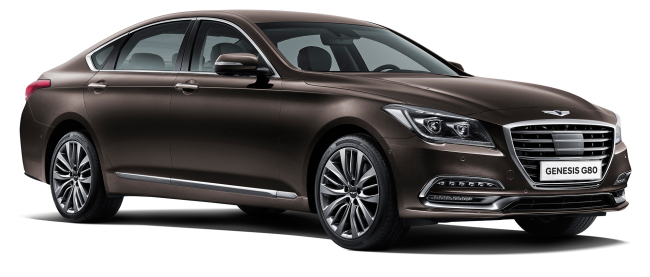[DECODED]
Hyundai Motor’s aspirations to separate its premium brand Genesis from the globally recognized budget Hyundai image may take much longer than the company expects, market experts said.
The nation’s largest automaker plans to completely separate Genesis by 2020 with six models so that luxury-seeking consumers no longer associate it with the cheap and mass-produced Hyundai brand when buying Genesis. “More than 10 years is expected for Genesis to be recognized as a truly separate brand from Hyundai -- like Lexus is now from Toyota -- as it is not easy to remove a brand image in a short time” Cho Chul, a senior researcher at the Korea Institute for Industrial Economics & Trade, told The Korea Herald.
 |
Hyundai Motor’s vice chairman Chung Eui-sun launches the Genesis brand at its brand strategy press conference in November, 2015. (Hyundai Motor) |
Hyundai, which is still regarded as a budget model in the global market, has a long way to go before it will see high volume luxury sales. Hyundai sold less than 26,000 units of its luxury brand cars (Genesis and Equus) between 2012 and 2014 in the U.S. market, according to IHS Automotive data.
The figure is much smaller than the 64,000 Lexus units sold in the nation -- with only two sedans -- back in 1989 and 1990 when the brand was first launched.
Experts said that Hyundai would need a huge marketing push in order to get rid of its low-end brand image.
“An enormous marketing cost is needed to settle the brand globally. More than $1 billion is necessary to promote the Genesis brand only in the U.S. market,” said Eric Choi, an author of Auto Empire and former analyst at Shinhan Investment Corp.
Hyundai reportedly spent around $15 million on Super Bowl commercials during the 2016 game as an official auto sponsor of the National Football League, a professional American football league.
Another challenge for the Genesis brand would be breaking into the German-dominated European market.
“To launch a premium brand in Europe is a challenge and it’s an even bigger challenge if you don’t have the products you need for the market,” Hyundai Europe chief operating officer Thomas Schmid told Automotive News Europe. “Europe won’t see it before 2019. The main reason is because we need different powertrains.”
 |
Genesis G80 (Hyundai Motor) |
Genesis has no diesel engines, which are dominant powertrains in the European auto market. However, powertrains aren’t the brand’s only shortcoming. Experts say Hyundai is not yet ready to compete head-on with strong German brands in the market where consumers consider brand legacy and value separate from driving performance and design.
Japanese brands including Lexus and Infiniti have also failed to capture a meaningful share in the market. Last year they sold 39,255 units and 5,427 units each, grabbing a combined market share of less than 0.5 percent, according to industry data.
If Genesis is not successful, it would strike a big blow to the automaker amid declining sales in its largest market, China, where growing local companies are threatening the position of Hyundai.
“Hyundai, which has no luxury brand, will have more pressure from Chinese low-end companies than other German and Japanese brands viewed as premium brands in the nation,” said Kim Hyun-cheol, a professor of Seoul National University and former head of the Korean Academy of Motor Industry.
According to the latest report of McKinsey & Company, Chinese consumers are less loyal to Hyundai cars than most other auto brands, with 43 percent of those who owned a Korean brand car wanting to switch to a more upscale brand.
Apart from China, Hyundai has also seen declining sales in other emerging nations including Russia and Brazil due to an economic slowdown and weak currencies.
“The success of Genesis is vital as stakes are high for Hyundai, which faces growing competition from low-end automakers in the unexpected global business environment,” Eric Choi said.
By Shin Ji-hye (
shinjh@heraldcorp.com)









